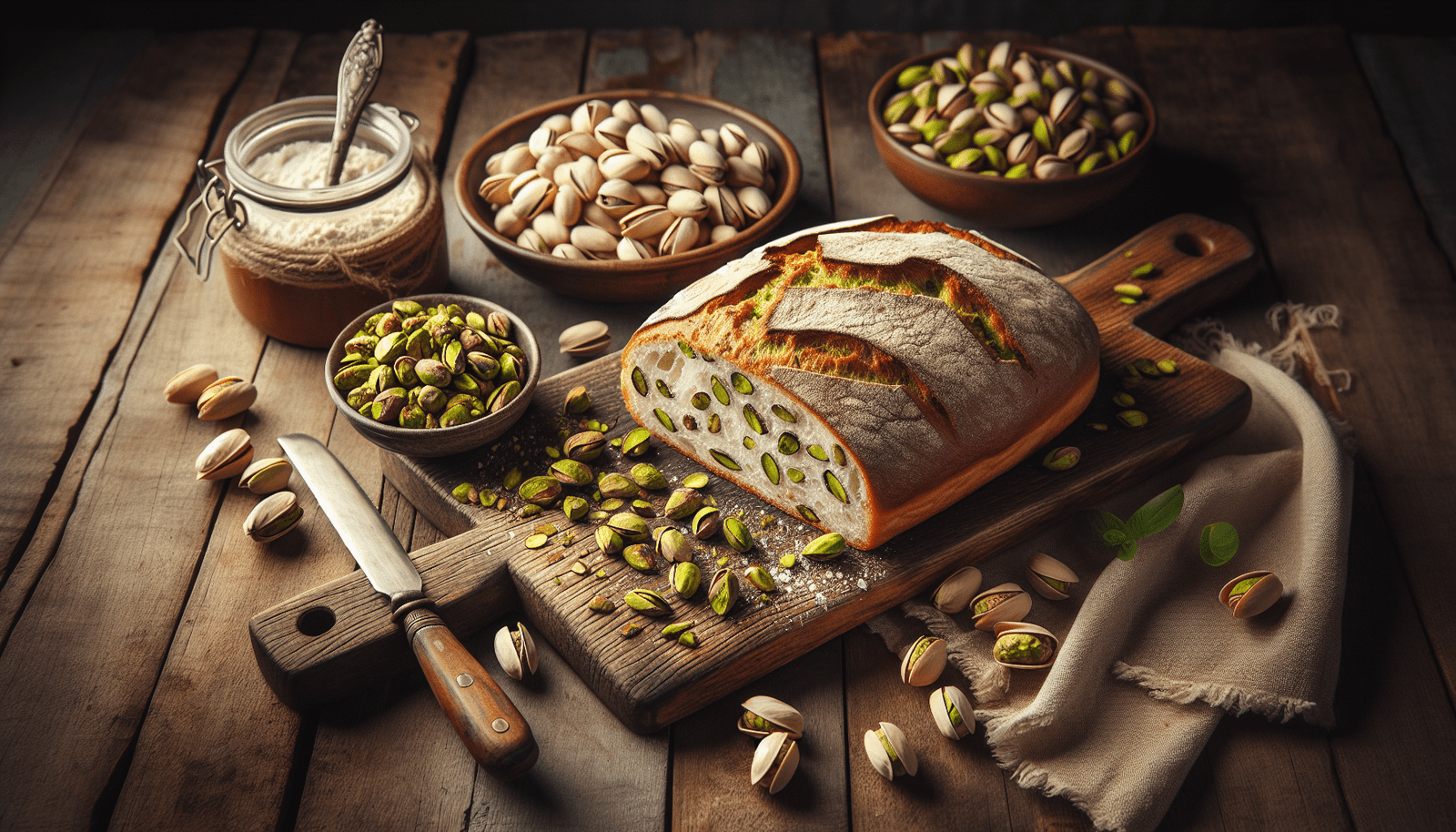Imagine sinking your teeth into a slice of warm, moist, and nutty pistachio bread. This delectable recipe combines the rich flavors of roasted pistachios with the perfect balance of sweetness, creating a heavenly treat that will leave you craving for more. Whether you’re a seasoned baker or a novice in the kitchen, this easy-to-follow recipe for pistachio bread will surely become your go-to indulgence. Get ready to embark on a culinary adventure that will delight your taste buds and impress your friends and family.
Ingredients
To make a delicious pistachio bread, you will need the following ingredients:
All-purpose flour
All-purpose flour serves as the base of the bread and provides structure. Make sure to use a good quality flour for the best results.
Baking powder
Baking powder is a leavening agent that helps the bread rise and gives it a light and fluffy texture.
Salt
Salt is an essential ingredient that enhances the flavors in the bread and helps balance the sweetness.
Unsalted butter
Butter adds richness and moisture to the bread. Using unsalted butter allows you to control the amount of salt in the recipe.
Granulated sugar
Granulated sugar provides sweetness to the bread. It also helps to create a tender texture in the final product.
Eggs
Eggs act as a binding agent and add structure to the bread. They also contribute to the moistness and richness of the final loaf.
Vanilla extract
Vanilla extract adds a warm and fragrant flavor to the pistachio bread. It complements the nuttiness of the pistachios beautifully.
Buttermilk
Buttermilk adds tanginess and moisture to the bread. It helps create a tender and moist texture while giving the bread a subtle tangy flavor.
Chopped pistachios
Chopped pistachios are the star ingredient in this bread. They add a wonderful crunch and a rich, nutty flavor profile.
Pistachio paste
Pistachio paste enhances the pistachio flavor in the bread and gives it a vibrant green color. It adds richness and creaminess to the overall texture.
Preparation
Before you start making the pistachio bread, there are a few preparation steps you need to take:
Preheat the oven
Preheat your oven to the specified temperature in the recipe. This ensures that your oven is ready to bake the bread once you’ve prepared the batter.
Prepare the loaf pan
Grease a loaf pan with butter or non-stick cooking spray. This will prevent the bread from sticking to the pan while baking. Make sure to evenly coat the sides and bottom of the pan.
Combine dry ingredients
In a medium-sized mixing bowl, whisk together the all-purpose flour, baking powder, and salt. This step ensures that all the dry ingredients are evenly distributed, resulting in a uniform texture in the bread.
Cream butter and sugar
In a large mixing bowl, cream together the unsalted butter and granulated sugar until light and fluffy. This can be done using an electric mixer or by hand with a wooden spoon. Creaming the butter and sugar together creates air pockets in the mixture, which helps the bread rise.
Add eggs and vanilla
Add the eggs, one at a time, to the butter-sugar mixture. Beat well after each addition to fully incorporate the eggs. Then, add the vanilla extract and mix until well combined. The eggs and vanilla add moisture and flavor to the bread.
Alternate adding dry ingredients and buttermilk
Gradually add the dry ingredient mixture and the buttermilk to the batter, starting and ending with the dry ingredients. Mix just until the ingredients are fully incorporated. Be careful not to overmix, as this can result in a dense and tough bread.
Fold in chopped pistachios
Gently fold in the chopped pistachios into the batter until evenly distributed. Be sure not to overmix at this stage to prevent the bread from becoming tough.
Transfer batter to loaf pan
Pour the prepared batter into the greased loaf pan, spreading it evenly. Use a spatula to smooth the top for an even rise during baking.
Bake until golden brown
Place the loaf pan in the preheated oven and bake for the specified time in the recipe, or until the bread is golden brown and a toothpick inserted into the center comes out clean. Baking times may vary, so keep an eye on the bread as it bakes.
Cool and enjoy
Once the pistachio bread is baked, remove it from the oven and let it cool in the pan for about 10 minutes. Then, transfer the bread to a wire rack to cool completely before slicing. Once cooled, cut into slices and enjoy!

Tips and Variations
Here are some tips and variations to elevate your pistachio bread:
Add lemon zest for a citrusy twist
To add a burst of citrus flavor, try adding some freshly grated lemon zest to the batter. The zesty aroma and tangy taste will complement the pistachios beautifully.
Replace pistachio paste with almond paste
If you’re not a fan of pistachio paste or cannot find it, you can substitute it with almond paste. This swap will still provide a rich and nutty flavor.
Sprinkle powdered sugar on top for decoration
For an elegant touch, dust the top of the pistachio bread with powdered sugar before serving. It adds a touch of sweetness and a visually appealing finish.
Serve with honey or jam for extra sweetness
For an extra indulgent treat, serve your pistachio bread with a drizzle of honey or a dollop of your favorite jam. The combination of flavors will delight your taste buds.
Storage and Freezing
If you have any leftover pistachio bread or want to make it ahead of time, here are some storage and freezing tips:
Wrap tightly in plastic wrap and store at room temperature for up to 3 days
To keep the pistachio bread fresh for a few days, tightly wrap it in plastic wrap and store it at room temperature. It will stay moist and delicious for up to three days.
To freeze, wrap in plastic wrap and then aluminum foil. Freeze for up to 3 months. Thaw overnight in the refrigerator before serving
If you’re making the pistachio bread in advance or want to save some for later, you can freeze it. Wrap the loaf tightly in plastic wrap to prevent freezer burn, then wrap it in aluminum foil for added protection. The bread can be frozen for up to three months. To thaw, simply place it in the refrigerator overnight before serving.

Health Benefits of Pistachios
Pistachios, the main ingredient in pistachio bread, offer numerous health benefits. Here are some reasons to incorporate pistachios into your diet:
Rich in healthy fats and protein
Pistachios are a good source of healthy fats, including monounsaturated and polyunsaturated fats. These fats are beneficial for heart health and can help lower bad cholesterol levels. Pistachios also contain protein, making them a satisfying and nutritious snack.
High in fiber for improved digestion
Pistachios are high in dietary fiber, which aids in digestion and helps regulate bowel movements. Including pistachios in your diet can contribute to a healthy digestive system.
Packed with antioxidants for heart health
Pistachios are rich in antioxidants, including lutein and zeaxanthin, which help protect against inflammation and oxidative stress. These antioxidants contribute to heart health and may help reduce the risk of cardiovascular diseases.
May help reduce cholesterol levels
Regular consumption of pistachios has been associated with improved lipid profiles. Studies have shown that pistachios can help lower bad cholesterol (LDL) levels and increase good cholesterol (HDL) levels. This beneficial effect on cholesterol levels can help maintain cardiovascular health.
History of Pistachios
Pistachios have a long and fascinating history, originating in the Middle East and Central Asia. Here are some key points about the history of pistachios:
Originated in the Middle East and Central Asia
Pistachios are believed to have originated in the region extending from present-day Iran to western Turkmenistan. The trees were first cultivated in this area approximately 2,000 to 3,000 years ago.
Cultivated for over 2,000 years
Pistachios have been enjoyed for centuries, with evidence of their cultivation dating back thousands of years. They were highly valued for their taste and nutritional properties.
Known as the ‘smiling nut’ in Iran
In Iran, pistachios are often referred to as the ‘smiling nut’ due to the way the shell opens naturally to reveal the green nut inside. This unique characteristic led to its nickname and has made it a treasured symbol of happiness and good fortune.
First introduced to the United States in the 1850s
Pistachios were introduced to the United States in the mid-19th century by a pioneer named Charles Mason. He imported a small quantity of pistachio trees from Persia (now Iran) and planted them in California. Today, California is one of the largest producers of pistachios in the world.
Pistachio Bread as a Gift
Pistachio bread makes a delightful and thoughtful gift for friends and family. Here are some tips on how to make it extra special:
Wrap the loaf in decorative paper and ribbon
To present your pistachio bread as a gift, wrap it in decorative paper and tie it with a festive ribbon. This adds a personal touch and makes the gift even more appealing.
Include a personalized note with the recipe
For an extra-special touch, include a personalized note with the recipe. Share your love for pistachio bread and any special tips or memories associated with the recipe. It will make the gift even more meaningful.
Pair with a jar of pistachio butter or pistachio jam
To enhance the experience of enjoying the pistachio bread, consider pairing it with a jar of pistachio butter or pistachio jam. These condiments will complement the flavors of the bread and allow the recipient to create their own delicious combinations.
Allergy and Dietary Information
Pistachio bread can be easily adapted to suit different dietary needs. Here are a few alternatives to accommodate allergies and preferences:
Gluten-free alternative: Use a gluten-free flour blend
If you’re following a gluten-free diet or have gluten sensitivities, you can substitute the all-purpose flour with a gluten-free flour blend. Look for a blend specifically designed for baking, and follow the recommended measurements for substitution.
Dairy-free alternative: Replace butter with coconut oil and buttermilk with plant-based milk
To make the pistachio bread dairy-free, replace the unsalted butter with coconut oil and the buttermilk with your choice of plant-based milk, such as almond or soy milk. The coconut oil adds richness, and the plant-based milk provides the necessary moisture.
Nut-free alternative: Substitute pistachios with pumpkin seeds or sunflower seeds
If you have nut allergies or simply prefer not to use pistachios, you can substitute them with an equal amount of pumpkin seeds or sunflower seeds. These seeds will provide a similar texture and add a delicious nutty flavor to the bread.
Nutritional Information
Here is the nutritional information for a serving of pistachio bread:
- Calories: 250 per serving
- Total Fat: 12g
- Saturated Fat: 5g
- Cholesterol: 50mg
- Sodium: 250mg
- Carbohydrates: 30g
- Fiber: 2g
- Sugar: 15g
- Protein: 5g
Please note that these values may vary depending on the specific ingredients used and the portion size. It’s always a good idea to consult the packaging of the ingredients you use to ensure accurate nutritional information.
Conclusion
Pistachio bread is a delightful and unique baked good that is perfect for breakfast or as a snack. With its rich flavor and the crunch from the pistachios, it’s sure to become a new favorite in your baking repertoire. Whether you make it for yourself or give it as a gift, this pistachio bread is a treat that everyone will enjoy. So go ahead, gather your ingredients, follow the simple steps, and indulge in the deliciousness of homemade pistachio bread!


